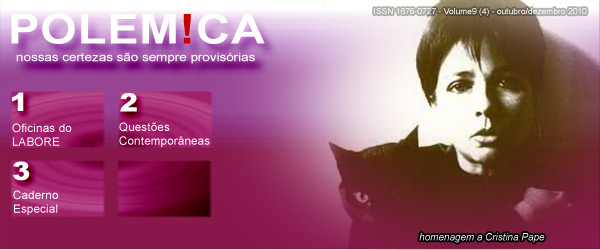A SUPERAÇÃO DO TRAUMÁTICO: DIÁLOGOS ENTRE A PSICANÁLISE E A TEORIA CRÍTICA NA ATUALIDADE
DOI:
https://doi.org/10.12957/polemica.2010.2816Resumo
Este trabalho tem por objetivo discutir teoricamente os dispositivos clínicos para superação de traumas psíquicos, por intermédio da articulação de diálogos entre a psicanálise e a teoria crítica de Honneth (2000). A superação do traumatismo está ligada às capacidades de mentalização e de simbolização. Como dispositivo clínico trata-se de se conferir um sentido à ferida, processo que se dá por intermédio de relações intersubjetivas significantes que reconhecem o sofrimento do traumatizado possibilitando-lhe uma continência favorecedora das ligações de sentido. Conclui-se que a necessidade de reconhecimento, como preconizada pela nova teoria crítica de Honneth (2000), apresenta-se como paradigmática para a abordagem terapêutica dos traumatismos, bem como aborda os conflitos e as patologias resultantes da violação das regras implícitas de reconhecimento, permitindo um diálogo com a psicanálise e seus dispositivos clínicos de tratamento do traumático.
Palavras-chave: Trauma, psicanálise, Teoria Crítica, tratamento clínico
Downloads
Publicado
Como Citar
Edição
Seção
Licença
Cabem ao autor/autora os direitos autorais dos artigos publicados na Polêm!ca, resguardando-se à revista o direito de primeira publicação. Cientes, revista e autores/as, que todos os artigos são de uso gratuito, para fins educacionais e não-comerciais, permitindo que outros remixem, adaptem e construam sobre o trabalho, desde que citada a fonte, quando da sua utilização integral ou parcial, de acordo com a licença Creative Commons CC BY-NC.
O(s) autor(es) tem/têm autorização para assumir contratos adicionais separadamente, para distribuição não-exclusiva da versão do trabalho publicada nesta revista (ex.: publicar em repositório institucional ou como capítulo de livro), com reconhecimento de autoria e publicação inicial nesta revista.
Respeitando a licença autoral adotada pela Polêm!ca, estimulamos nossos leitores a promover, refletir e escrever, a partir das nossas publicações, incluindo nas citações o link para o artigo disponível no site da Revista Polêm!ca, sempre que um artigo for citado ou replicado, e observando a grafia correta do nome da revista Polêm!ca.
Todo o conteúdo de terceiros (imagens, trechos, citações, etc.) deverá possuir referências a sua fonte original adicionadas como notas de rodapé ou referências bibliográficas com sua devida identificação.
Artigos submetidos que contiverem citações, tabelas ou imagens extraídas de outras publicações não serão aceitos, caso possuam mais conteúdo de terceiros do que conteúdo original.

Revista Polêm!ca está licenciada com uma Licença Creative Commons Atribuição-NãoComercial 4.0 Internacional.



